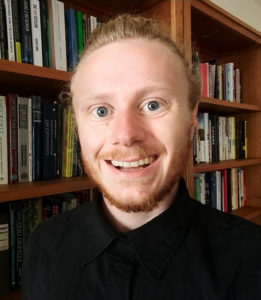Meet the New AHA Staff Member: Brody Armstrong

Please welcome the American Humanist Association’s new education assistant, Brody Armstrong!
TheHumanist.com: What is your educational and work background?
I graduated from the University of Iowa in the fall of 2016 where I triple-majored in philosophy, political science, and ethics & public policy. While attending university, I spent most of my time coordinating events to educate and engage fellow students on a broad spectrum of human-rights issues. After graduating I moved to Washington, DC, for a college organizing internship at an advocacy nonprofit focused on international development. I later switched to the policy team to support research on gender equality and education. My work there inspired me to pursue a master’s degree in data, economics, and development policy through a joint program between M.I.T’s Department of Economics and the Abdul Latif Jameel Poverty Action Lab. My background and interests have been varied, but all focused toward improving the welfare of my fellow humans. For that reason, I know the AHA is a perfect fit for me.
 TheHumanist.com: How did you first learn about humanism?
TheHumanist.com: How did you first learn about humanism?
Although I wasn’t formally introduced to humanism until I took an Introduction to Ethics course in college, I’ve been adhering to and espousing humanist values for most of my conscious life—I just didn’t have the label for it. My parents greatly encouraged reason-based thinking and compassion, so learning about humanism gave structure and definition to a life stance I had already been living. Upon further philosophical study, I gained a deep appreciation for how well a humanist worldview encompasses my ethical, metaphysical, epistemological, and political attitudes. I work to become a better humanist every day, and I’m ecstatic to be working with an organization whose values mirror my own.
TheHumanist.com: Did you grow up in a traditional religious faith? How did it impact you?
I was raised by two Christian parents who took me to church nearly every week until about the age of twelve, but my association with Christianity was far from fundamentalist. Rather than promoting faith as strict dogma, my parents chose to focus on the lessons and themes that the Bible promoted. When Christians used scripture to control the lives of others, my parents would speak against it. In fact, the final reason our family left our congregation was because church leadership was preaching to influence votes in the 2008 election. After that, I would attend church services occasionally with friends, but as I grew up my Christian beliefs gave way to skepticism. Looking back, I remember questioning core components of Christian belief around the age of five, though I had a long journey from Christianity to a sort of non-religiosity, to agnosticism, to finally identifying as an atheist around my sophomore year of college.
Despite my current nonreligious status, growing up Christian gave me an appreciation of the good that can come from religion when it is tolerant and focused on uplifting others. In the end, I think actions matter far more than beliefs.
TheHumanist.com: What interested you most about working for the American Humanist Association?
For a long time, the best answer Ihad to “What do you want to be when you grow up?” was that I just want to leave the world a better place than I found it. Obviously, that doesn’t indicate any particular career path, but that attitude got me involved in a diverse set of causes—poverty alleviation, racial and gender equality, sustainability, refugee relief, and more. My own varied scope of interest is mirrored by the mission statement of the American Humanist Association, and I’m excited to work on a broad set of projects.
TheHumanist.com: What book has influenced you the most?
If I had to choose, it would probably be The Giver by Lois Lowry. I first read the book in elementary school and have read it several times since, picking up on new themes each time. The book broaches so many important subjects: justice, freedom of choice, the roles of the state, family, and community, and the importance of learning, compassion, and emotional maturity. I’m certain it played a formative role on my worldview.
TheHumanist.com: If you could have dinner with any three people in the world (living or dead), who would they be and why?
First, I would love to play guitar with the King of the Blues, B.B. King, although I’m not sure I’m worthy. His style was simple, yet so sophisticated that soul just oozed out of every note he played. I’m sure he would have a lot to tell me—not just about music, but about race, class, and the civil rights movement. I’d also like to reunite Carl Sagan and Neil DeGrasse Tyson to brainstorm plans for a third season of Cosmos.
